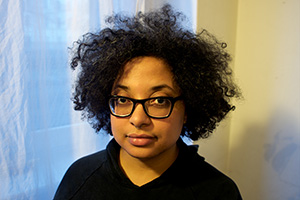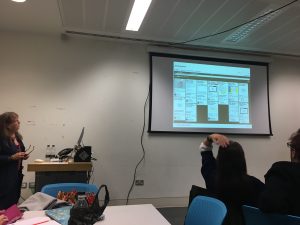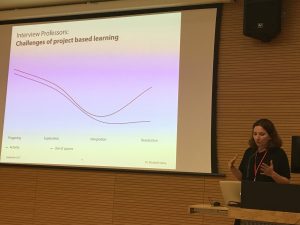The Digitally Engaged Learning – DEL 2017 conference gathered around 100 academics and practitioners at Central St Martins, UAL, to discuss Teaching/Making – Marking/Teaching.
http://www.digitallyengagedlearning.net/2017/
The conference was opened by Diana Arce’s (http://visualosmosis.com) powerful appeal to not forget the supremacy of ‘real’ human action and interaction. The digital can and should be used to connect people face-to-face. Digital data needs to be used to create equality, fight racism and stereotypes, argues Diana.

Off to parallel tracks. Elizabeth Kaliva’s very interesting talk demonstrated how staff, students and alumni at KISD (https://kisd.de/en/) co-create digital learning environments. A WordPress-based social learning environment facilitates project-based collaborative learning. Everyone can create a space to promote a project, but not all projects maintain online activity successfully, up to the end or beyond the project’s end. Projects with high member cohesion, clear roles, and well-maintained deadlines manage to engage in online social learning and interaction much better.
Parson’s (https://www.newschool.edu/parsons/) Mariah Doren and Anette Millington demonstrated how reflection is facilitated through the creation of e-portfolios. In and after each step in creating artefacts for the e-portfolio, students are asked “What did you learn from this exercise? What do you now know what you didn’t know before?” The answer to this question is the learning that is taken forward to the next stage of the portfolio building activities. They have developed a rubric to analyse the effectiveness on reflection on action (on the e-portfolio), too.
After lunch, our very own Georgy Holden from the Open University, presented students’ perceptions on the OpenDesignStudio as part of our eSTEeM funded scholarship project “Are we making progress?”. Georgy reported that we indeed do make progress. Students value OpenStudio and engage in social learning, but not equally at all levels of study across our qualification. How can we facilitate higher level students to benefit from the social learning opportunities the OpenStudio offers as much as first level students do?

The final panel introduced the ‘Feminist Internet’ to the delegates. Students from UAL participated in a 10-day workshop to create a manifesto and example projects that embody the feminist manifesto’s principles. Their presentations returned to where the day had started, the call for more inclusive digital practices.
The second day had a fantastic start from Thomas Castro and his work at LUST and LUST lab in the Netherlands.
Another talk by Thomas, Video is 52 min
Only seeing their inspiring projects that transcend design, art and technology is fascinating enough, but what really inspired me was hearing his take on how design project work is changing, and how he tries to integrate these into his teaching and even new curricula, too.
Two discussion rounds focused on the future curriculum and teaching, raising many questions but few answers to questions of social learning in online environments. How can we give confidence to share your design work and expose your thoughts to other learners? What do you think?


Leave a Reply